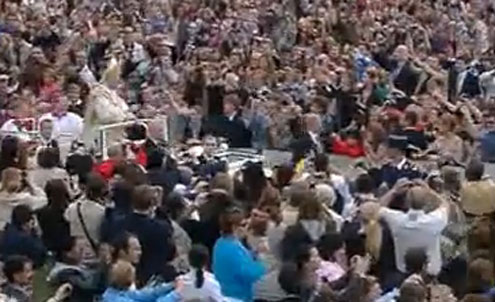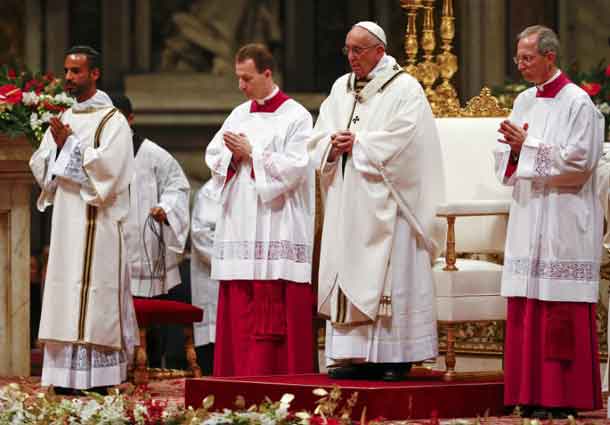 VATICAN CITY – “Believing in Charity Calls Forth Charity: ‘We have come to know and to believe in the love God has for us’ (1 Jn 4:16)” is the title of the Holy Father’s Lenten Message this year. The document, published in eight languages (German, Arabic, Spanish, French, English, Italian, Polish, and Portuguese) is from the Vatican.
VATICAN CITY – “Believing in Charity Calls Forth Charity: ‘We have come to know and to believe in the love God has for us’ (1 Jn 4:16)” is the title of the Holy Father’s Lenten Message this year. The document, published in eight languages (German, Arabic, Spanish, French, English, Italian, Polish, and Portuguese) is from the Vatican.
Pope Benedict XVI on Lent
Dear Brothers and Sisters,
The celebration of Lent, in the context of the Year of Faith, offers us a valuable opportunity to meditate on the relationship between faith and charity: between believing in God?the God of Jesus Christ?and love, which is the fruit of the Holy Spirit and which guides us on the path of devotion to God and others.
1. Faith as a response to the love of God
In my first Encyclical, I offered some thoughts on the close relationship between the theological virtues of faith and charity. Setting out from Saint John’s fundamental assertion: “We have come to know and to believe in the love God has for us”, I observed that “being Christian is not the result of an ethical choice or a lofty idea, but the encounter with an event, a person, which gives life a new horizon and a decisive direction … Since God has first loved us, love is now no longer a mere ‘command’; it is the response to the gift of love with which God draws near to us”. Faith is this personal adherence?which involves all our faculties?to the revelation of God’s gratuitous and “passionate” love for us, fully revealed in Jesus Christ. The encounter with God who is Love engages not only the heart but also the intellect: “Acknowledgement of the living God is one path towards love, and the ‘yes’ of our will to his will unites our intellect, will and sentiments in the all-embracing act of love. But this process is always open-ended; love is never ‘finished’ and complete”. Hence, for all Christians, and especially for “charity workers”, there is a need for faith, for “that encounter with God in Christ which awakens their love and opens their spirits to others. As a result, love of neighbour will no longer be for them a commandment imposed, so to speak, from without, but a consequence deriving from their faith, a faith which becomes active through love”. Christians are people who have been conquered by Christ’s love and accordingly, under the influence of that love?“Caritas Christi urget nos”? they are profoundly open to loving their neighbour in concrete ways. This attitude arises primarily from the consciousness of being loved, forgiven, and even served by the Lord, who bends down to was h the feet of the Apostles and offers himself on the Cross to draw humanity into God’s love.
“Faith tells us that God has given his Son for our sakes and gives us the victorious certainty that it is really true: God is love! … Faith, which sees the love of God revealed in the pierced heart of Jesus on the Cross, gives rise to love. Love is the light?and in the end, the only light?that can always illuminate a world grown dim and give us the courage needed to keep living and working”. All this helps us to understand that the principal distinguishing mark of Christians is precisely “love grounded in and shaped by faith”.
2. Charity as life in faith
The entire Christian life is a response to God’s love. The first response is precisely faith as the acceptance, filled with wonder and gratitude, of the unprecedented divine initiative that precedes us and summons us. And the “yes” of faith marks the beginning of a radiant story of friendship with the Lord, which fills and gives full meaning to our whole life. But it is not enough for God that we simply accept his gratuitous love. Not only does he love us, but he wants to draw us to himself, to transform us in such a profound way as to bring us to say with Saint Paul: “it is no longer I who live, but Christ who lives in me”.
When we make room for the love of God, then we become like him, sharing in his own charity. If we open ourselves to his love, we allow him to live in us and to bring us to love with him, in him and like him; only then does our faith become truly “active through love”; only then does he abide in us.
Faith is knowing the truth and adhering to it; charity is “walking” in the truth. Through faith we enter into friendship with the Lord, through charity this friendship is lived and cultivated. Faith causes us to embrace the commandment of our Lord and Master; charity gives us the happiness of putting it into practice. In faith we are begotten as children of God; charity causes us to persevere concretely in our divine sonship, bearing the fruit of the Holy Spirit. Faith enables us to recognize the gifts that the good and generous God has entrusted to us; charity makes them fruitful.
3. The indissoluble interrelation of faith and charity
In light of the above, it is clear that we can never separate, let alone oppose, faith and charity. These two theological virtues are intimately linked, and it is misleading to posit a contrast or “dialectic” between them. On the one hand, it would be too one-sided to place a strong emphasis on the priority and decisiveness of faith and to undervalue and almost despise concrete works of charity, reducing them to a vague humanitarianism. On the other hand, though, it is equally unhelpful to overstate the primacy of charity and the activity it generates, as if works could take the place of faith. For a healthy spiritual life, it is necessary to avoid both fideism and moral activism.
The Christian life consists in continuously scaling the mountain to meet God and then coming back down, bearing the love and strength drawn from him, so as to serve our brothers and sisters with God’s own love. In sacred Scripture, we see how the zeal of the Apostles to proclaim the Gospel and awaken people’s faith is closely related to their charitable concern to be of service to the poor. In the Church, contemplation and action, symbolized in some way by the Gospel figures of Mary and Martha, have to coexist and complement each other. The relationship with God must always be the priority, and any true sharing of goods, in the spirit of the Gospel, must be rooted in faith. Sometimes we tend, in fact, to reduce the term “charity” to solidarity or simply humanitarian aid. It is important, however, to remember that the greatest work of charity is evangelisation, which is the “ministry of the word”. There is no action more beneficial – and therefore more charitable – towards one’s neighbour than to break the bread of the word of God, to share with him the Good News of the Gospel, to introduce him to a relationship with God: evangelisation is the highest and the most integral promotion of the human person. As the Servant of God Pope Paul VI wrote in the Encyclical “Populorum Progressio”, the proclamation of Christ is the first and principal contributor to development. It is the primordial truth of the love of God for us, lived and proclaimed, that opens our lives to receive this love and makes possible the integral development of humanity and of every man.
Essentially, everything proceeds from Love and tends towards Love. God’s gratuitous love is made known to us through the proclamation of the Gospel. If we welcome it with faith, we receive the first and indispensable contact with the Divine, capable of making us “fall in love with Love”, and then we dwell within this Love, we grow in it and we joyfully communicate it to others.
Concerning the relationship between faith and works of charity, there is a passage in the Letter to the Ephesians which provides perhaps the best account of the link between the two: “For by grace you have been saved through faith; and this is not your own doing; it is the gift of God; not because of works, lest anyone should boast. For we are his workmanship, created in Christ Jesus for good works, which God prepared beforehand, that we should walk in them”. It can be seen here that the entire redemptive initiative comes from God, from his grace, from his forgiveness received in faith; but this initiative, far from limiting our freedom and our responsibility, is actually what makes them authentic and directs them towards works of charity. These are not primarily the result of human effort, in which to take pride, but they are born of faith and they flow from the grace that God gives in abundance. Faith without works is like a tree without fruit: the two virtues imply one another. Lent invites us, through the traditional practices of the Christian life, to nourish our faith by careful and extended listening to the word of God and by receiving the sacraments, and at the same time to grow in charity and in love for God and neighbour, not least through the specific practices of fasting, penance and almsgiving.
4. Priority of faith, primacy of charity
Like any gift of God, faith and charity have their origin in the action of one and the same Holy Spirit, the Spirit within us that cries out “Abba, Father”, and makes us say: “Jesus is Lord!” and “Maranatha!”.
Faith, as gift and response, causes us to know the truth of Christ as Love incarnate and crucified, as full and perfect obedience to the Father’s will and infinite divine mercy towards neighbour; faith implants in hearts and minds the firm conviction that only this Love is able to conquer evil and death. Faith invites us to look towards the future with the virtue of hope, in the confident expectation that the victory of Christ’s love will come to its fullness. For its part, charity ushers us into the love of God manifested in Christ and joins us in a personal and existential way to the total and unconditional self-giving of Jesus to the Father and to his brothers and sisters. By filling our hearts with his love, the Holy Spirit makes us sharers in Jesus’ filial devotion to God and fraternal devotion to every man.
The relationship between these two virtues resembles that between the two fundamental sacraments of the Church: Baptism and Eucharist. Baptism (“sacramentum fidei”) precedes the Eucharist (“sacramentum caritatis”), but is ordered to it, the Eucharist being the fullness of the Christian journey. In a similar way, faith precedes charity, but faith is genuine only if crowned by charity. Everything begins from the humble acceptance of faith (“knowing that one is loved by God”), but has to arrive at the truth of charity (“knowing how to love God and neighbour”), which remains for ever, as the fulfilment of all the virtues.
Dear brothers and sisters, in this season of Lent, as we prepare to celebrate the event of the Cross and Resurrection?in which the love of God redeemed the world and shone its light upon history?I express my wish that all of you may spend this precious time rekindling your faith in Jesus Christ, so as to enter with him into the dynamic of love for the Father and for every brother and sister that we encounter in our lives. For this intention, I raise my prayer to God, and I invoke the Lord’s blessing upon each individual and upon every community!
Pope Benedict XVI







